Fast Times at Marin Catholic
High
A Case That the Archdiocese of San Francisco Apparently Doesn't Want You
to Know about
By Ron Russell
SF Weekly
January 19, 2005
http://www.sfweekly.com/2005-01-19/news/fast-times-at-marin-catholic-high/print
Barely a month before Father Gregory Ingels was arraigned in 2003 on charges
of molesting a teenage boy years earlier, Jane Parkhurst sat down with
a Marin County sheriff's investigator to place a phone call to the priest—a
call that the investigator recorded without Ingels' knowledge.
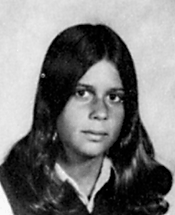 |
| Jane Parkhurst at age 15. |
Parkhurst, 46, a former cop and a bit TV and movie actress, had decided
to unburden herself of a painful secret she had carried since her days
as a student at Marin Catholic High School. She told authorities that
Ingels had sexually abused her for four years starting in 1973, when she
was a freshman at the school in suburban Kentfield and Ingels was a teacher
and a church deacon about to be ordained as a priest.
The strained phone conversation lasted only a few minutes and did not
net incriminating evidence. According to sheriff's records, when Parkhurst
alluded to specific improprieties—which she says included oral copulation
and Ingels' routinely having her masturbate him—Ingels spoke as
if he was "shocked" and insisted that nothing improper had occurred
between them.
What Ingels had no way of knowing was that Parkhurst was about to provide
sheriff's investigators with nearly three dozen love letters that Ingels
had written to her, starting in 1974. She continued to receive letters
from the priest even after he went away to Rome in 1977 to study canon
law. Parkhurst also turned over to investigators meticulously kept personal
calendars pertaining to the years of the alleged abuse.
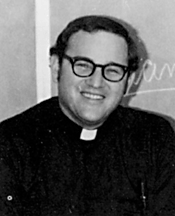 |
| Father Gregory Ingels in 1973. |
It was more than enough for Marin County District Attorney Paula Kamena
to begin preparing to file criminal charges against Ingels. (She had already
readied charges with respect to the aforementioned boy.) But the DA's
plans were abruptly halted by the U.S. Supreme Court decision overturning
the 1994 California law that had extended the statute of limitation for
sex crimes and made it possible for accused offenders to be charged long
after the alleged crimes had occurred. The law had been challenged by
75-year-old Marion Stogner, a former Contra Costa County factory worker
who was charged in 1998 with sexually abusing his two daughters between
the 1950s and 1970s. The decision had huge implications for the church
sex scandal, forcing prosecutors throughout California to drop criminal
charges against scores of priests accused of past misconduct.
"I'll never forget how sad [now-acting District Attorney] Ed Berberian
sounded the day he called to tell us they wouldn't be going forward against
Ingels," recalls Doug Parkhurst, a retired police officer who supports
his wife's decision to go public with her allegations.
Berberian did not return phone calls seeking comment.
________________
Jane Parkhurst is a slim woman with short-cropped hair that befits her image as a SWAT team expert in the U.S. Army Reserve. (The Demi Moore film G.I. Jane, on which Parkhurst consulted, was largely inspired by her exploits.) But the formidable exterior hid vulnerability and ugly secrets that, Parkhurst says, she kept "bottled up inside for years." Even after she began seeing a psychiatrist in 2002 and came to grips with what she calls "my living nightmare," the one-time regular on the Nash Bridges TV series says she didn't decide to go public until she realized that "unburdening myself of this is the only chance I have to heal the emotional damage done to me."
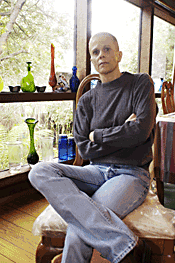 |
| Parkhurst at her Mill Valley home. [Photo by] James Sanders. |
To that end, she has purposely chosen to do something that few alleged
sex abuse victims who sue their accusers do: She has insisted on using
her name, rather than being listed as a "Jane Doe." "Jane
[Parkhurst] is an exceptionally courageous woman who sees what she's doing
as not only helping herself but helping others," says Robert M. Tobin,
one of Parkhurst's attorneys.
The lawsuit on her behalf names the Archdiocese of San Francisco along
with Ingels and ex-priest Guy Murnig (another former Marin Catholic teacher
who she contends sexually abused her). Among other things, it accuses
the archdiocese, which includes Marin County, of fraudulently concealing
the conduct of its accused priests from law enforcement, Parkhurst's family,
and parishioners.
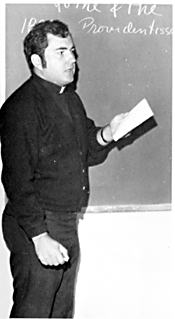 |
| Accused ex-priest and teacher Guy Murnig. |
Hers is among 150 cases against Roman Catholic dioceses in Northern
California being coordinated by Alameda County Superior Court Judge Ronald
M. Sabraw in Oakland. A few of the cases have already been set for trial,
starting in March. But given the stakes involved with respect to what
such trials could reveal about what high church officials knew and when
they knew it, some observers consider it highly likely that the more sensitive
cases will be settled out of court.
A gifted swimmer and track athlete, Parkhurst had just turned 15 and recalls
being "shy and vulnerable" when she came in contact with Ingels
at Marin Catholic in the fall of 1973.
She had lost both parents in an auto accident when she was 7 and had had
a rough time adjusting to the family that adopted her. Her lawsuit alleges
that Ingels first noticed her as the result of a black eye she sustained
during a scuffle at home. On the first day they met, she says, he stopped
her in a hallway to inquire about her eye and then asked her to step into
a private room to talk.
In the days that followed, Ingels called her aside on a regular basis,
usually inviting her into a small room behind the principal's office,
she says. His expressions were just "small talk" at first, she
says, peppered with assurances such as, "You can trust me" and
"You can tell me what you're feeling."
But before long, she says, the sessions took an unusual turn.
She says that Ingels would stand at a desk and demand that she give him
hugs, assuring her that "it's OK, I'm a priest." By the third
or fourth such meeting, she says, he began to pull her close to him and
would have an erection. Although she felt uncomfortable, she says she
was too scared to protest.
The sessions, which took place once or twice a day during the first half
of the school year, usually lasted about 20 minutes, she says. At times
when she was late for class she says Ingels told her to tell the teacher
that he was "counseling" her. During meetings in the school's
"media room" and elsewhere, she says, Ingels caressed her and
reassured her that everything was all right, telling her that "this
is our secret" and that "you're special to me. People will not
understand our relationship."
Not long before Christmas of 1973, she says, Ingels instructed her to
begin meeting him in his room at the church rectory next to the school's
track and football field. After ringing the doorbell, Parkhurst says,
she was typically let in by an elderly woman who escorted her downstairs
to Ingels' quarters. His was a private room with white walls and a bed
and windows that looked out toward Mount Tamalpais.
It was during her visits to the rectory that Ingels' physical advances
escalated, she says. Starting in January 1974, she says, he began the
first of many demands that she masturbate or fellate him. Her lawsuit
contends that on most such occasions the priest was in the habit of directing
her hands or mouth to his genitals without saying a word; other times
he would simply tell her to "take care of it."
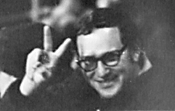 |
| Ingels taught Catholicism at Marin Catholic High in 1973. |
Although she says that she realized that "something wasn't right,"
she says that Ingels constantly reassured her that he loved her. "Looking
back, it may seem strange to people," Parkhurst says, "but I
was a mixed-up young kid going through a very difficult time in my life
and he made me feel special by singling me out."
Parkhurst says the priest continued to pursue her after her family moved
to Burlingame in the summer of 1974. (Ingels received his ordination as
a priest in May of that year.) She recalls his sexual advances—including
French kisses and touching her breasts—during his many visits to
the family home, routinely "two or three times a month," Parkhurst
says. She says he also engaged in sexual contact with her at her grandmother's
house in Millbrae.
Ingels aroused little suspicion in Parkhurst's adoptive parents, who she
says "thought it was great that a priest was taking such a personal
interest in me." She says Ingels often picked her up in his white
Mustang to play tennis or go for a ride. In May 1975, she says, he took
her to Marine World but insisted on leaving after only an hour. On the
way home, she contends that Ingels pulled off the road in Woodside and
demanded that she fellate him.
________________
Ingels' letters, written on official stationery of various Bay Area parishes
where he was assigned—all signed, "Love, Fr. Greg"—appear
to reflect an interest in young Parkhurst that was more than platonic.
The first such letter, dated July 10, 1974—after Ingels had been
reassigned to a church in Menlo Park and before Parkhurst had moved to
Burlingame—begins, "Don't let my moving away bother you too
much, Jane." Referring to a toy frog she had given him as a gift,
he says, "I still have Greg the Frog. He's sitting on a bookshelf
up above my chair. All your notes and pictures are in a special box in
my desk." After telling her that "I care for you very much and
want to remain close to you," he adds, "The talks we had about
s.e.x.: despite the fact that they were funny, did they help you? You
know you can ask me something about that anytime you want to."
In a letter postmarked six days later, Ingels explains the male reproductive
tract, telling Parkhurst about erections, nocturnal emissions, and seminal
fluid. ("It's usually sticky. It's not like urine at all.")
"Basically that's how a guy works," he concludes. The next week,
he takes up where he left off: "I wasn't embarrassed to tell you
about the way guys work," he writes, launching another explanation
of "wet dreams."
Another time, he writes, "Did I ever tell you my new private phone
number?" After giving the number, he says, "It's just like the
phone when I was at Blessed Sacrament. No one answers except me. So if
you would like to call every once in a while give me a call. If you are
worried about calling long distance then call collect." Another letter's
postscript urges, "Call collect in the evening if you can, around
9."
His missives largely consist of the kind of adolescent banter that would
be unremarkable if it weren't written by a newly ordained priest to a
teenage girl. He reveals that his favorite colors are "blue and green,
maybe yellow"; that his favorite car is the Ford Mustang; that he
wears a size 9 shoe; and that "besides the beach to look at all the
chicks, my favorite place to go is Southern California to visit my friends."
He discloses that his beer "isn't hidden. It's in a refrigerator
in the TV room here at St. Raymond's [in Menlo Park]." He confides,
"When I was a little brat I always wanted to be a priest. When I
grew up and became a big brat I became a priest."
The letters reveal someone who, when he is not suggestively broaching
the subject of sex, often proclaims love for the young Parkhurst. "I
think you are a person who wanted a close friend, someone to share her
life with a bit. You let me be that friend which means very much to me."
He tells her that even if she were to lie to him it "would not affect
my love for you or the way I feel about you. You had a number of things
upset you last year [1973] and sometimes when people are upset they don't
always tell the truth even when they mean to tell the truth. If that had
happened with you, Jane, I still would feel exactly the same way about
you that I feel right now. I love you and care for you very much."
In the same letter, in October 1974, Ingels says, "I am a better
person because of you. You are a better person because of me. It's only
when you have no one that you stop growing, stop improving, and die. I
hope that never happens to me, Jane, and I hope it never happens to you."
Ingels' attorney, Charles Renati, declined to comment except to say that
his client "denies that there was ever any abuse in any way."
________________
After Ingels was called to Rome to study law, correspondence between
him and Parkhurst dwindled before petering out in 1984. In one of the
last exchanges, in which Parkhurst had written to him about her struggle
with depression—which she now is convinced was largely due to the
alleged abuse—Ingels revealed that he had sought professional help
"for problems I was trying to deal with," without saying what
they were. "Jane, you know how much I care for you and love you,"
he wrote. "I always have."
But it was her last contact—the phone call from the sheriff's station—that
Parkhurst says sent a shiver through her.
Toward the end, frustrated that Ingels had brushed aside her references
to his sexual behavior by suggesting that nothing had happened between
them, she informed him that she had kept his letters.
His response, she says, was stunning in its focus.
"He asked two questions. First, he wanted to know if the letters
were typed or handwritten," Parkhurst says. "And second, he
asked me if he had signed them. To me, that sort of said it all."